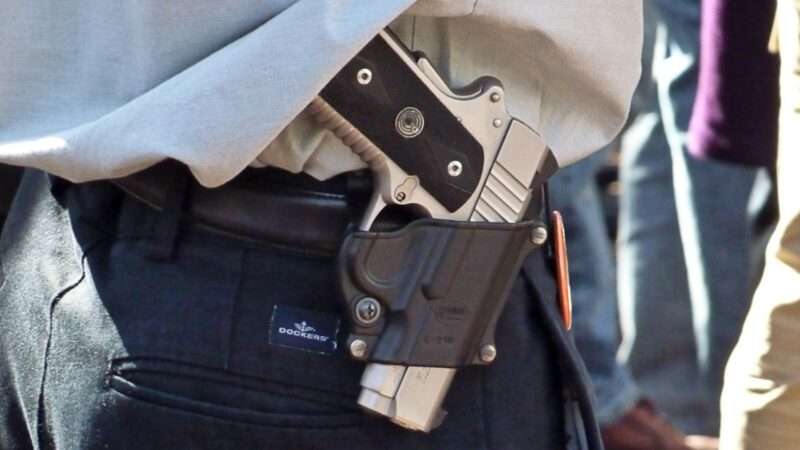
As of last week, 24 states have decided to let law-abiding adults carry handguns in public without a license. That policy, known as "constitutional carry," strikes critics as self-evidently reckless, while supporters think it improves public safety.
Both sides in the long-running debate about the practical impact of reducing legal barriers to public handgun possession can cite studies to support their position. But beyond that empirical question is a moral and constitutional issue that may render it moot: If people have a fundamental right to armed self-defense, should they need the government's permission to exercise it?
Because the proliferation of constitutional carry laws is a relatively recent development, research on its consequences is nascent. But there is a substantial, decidedly mixed body of research on an earlier shift: from "may issue" laws, which give government officials broad discretion to grant or deny applications for carry permits, and "shall issue" laws, which give licensing authorities little or no discretion as long as applicants meet a short list of objective requirements.
Only nine states still have "may issue" laws, one of which (New York's) is the focus of a case that the Supreme Court will decide this term. The rest either do not require permits or make it relatively easy to obtain them.
Proponents of the latter approach argue that it deters criminals by increasing the risk that they will encounter armed resistance. Opponents say that risk might make criminals more inclined to arm themselves, and they warn that reducing the legal requirements for carrying handguns could make potentially deadly violence more likely by introducing firearms into volatile situations.
A 2005 report from the National Research Council (NRC) concluded that "it is impossible to draw strong conclusions from the existing literature on the causal impact of these laws." One author of the NRC report, UCLA criminologist James Q. Wilson, dissented from that conclusion, saying the weight of the evidence indicated that "shall issue" laws "do in fact help drive down the murder rate, though their effect on other crimes is ambiguous."
According to a 2020 RAND Corporation analysis, the situation had not changed much 15 years later. The RAND review found "limited" evidence that "shall issue" laws "may increase" overall violent crime and "inconclusive" evidence of their impact on "total homicides, firearm homicides, robberies, assaults, and rapes."
There are many methodological issues with these studies, including how to control for myriad confounding variables and a general failure to measure how legal changes affect the number of people who actually carry handguns. But it is not at all clear that an individual's right to armed self-defense should hinge on the resolution of this academic debate.
Texas, where I live, stopped requiring carry permits last September. One compelling argument for eliminating the fees and training costs that the prior system entailed was that they posed formidable barriers for people of modest means in dangerous neighborhoods with good reason to fear violent criminals (who, by definition, do not bother to jump through legal hoops when they decide to carry guns).
The Supreme Court has said the Second Amendment guarantees an individual right to keep handguns in the home for self-defense. It will soon decide whether that right extends beyond the home.
Since the Second Amendment protects the right "to keep and bear arms," and since the threat of criminal violence is heightened when people venture past their doorsteps, that question does not seem hard, especially in light of historical evidence indicating that the right was understood to include carrying weapons in public. It likewise seems clear that a licensing regime like New York's, which gives officials wide authority to decide who has "proper cause" to bear arms, is inconsistent with that right.
Even after the Supreme Court settles those issues, there will remain the question of whether less onerous regulations impose inappropriate, potentially prohibitive conditions on the exercise of a basic right. Judging from recent trends, state legislators increasingly believe they do.
© Copyright 2022 by Creators Syndicate Inc.
The post Handgun Carry Permits Transform a Right Into a Privilege appeared first on Reason.com.







